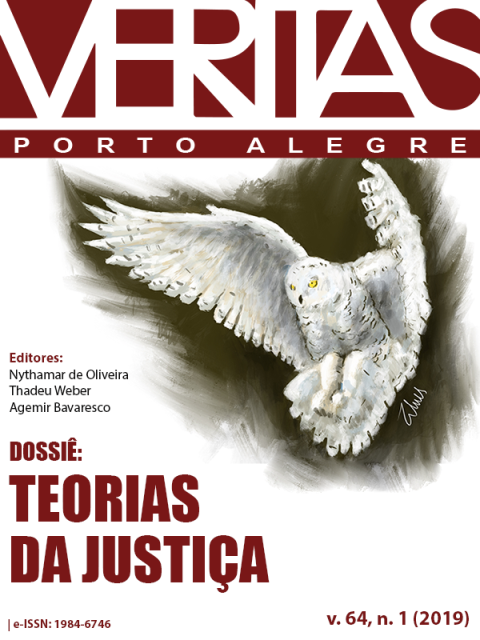Wille and Willkür: an analysis and an interpretation in the philosophy of Kant
DOI:
https://doi.org/10.15448/1984-6746.2019.1.32160Keywords:
Wille. Willkür. Freedom. Reason. Act.Abstract
Kant, along his thought, deepened and clarified the concepts of Wille and Willkür. Both concepts are fundamental to understanding the possibility of freedom, be it internal or external. The rational philosopher uses the concepts of Wille and Willkür from the Kritik der reinen Vernunft, but it will only be in the late work of the Metaphysik der Sitten (1798) that concepts will have semantic precision within the system of the metaphysics of freedom. As a result, we will go through the critical Kantian works from the Kritik der reinen Vernunft to the Metaphysik der Sitten to verify the “different” formulations of the Wille and Willkür concepts and, finally, to consider the one that seems most plausible in line with a systematic reading of Kantian thought.Downloads
References
ALL ISON, H. Morality and Freedom: Kant’s Reciprocity Thesis. Philosophical Review, v. 95, n. 33, p. 393-425, 1986.
https://doi.org/10.2307/2185466 DOI: https://doi.org/10.2307/2185466
ALL ISON, H. Kant’s Theory of Freedom. New York: Cambridge University Press, 1990.
BECK, L. W. Kant’s two conceptions of the will in their political context. In: BEINER, R.; BOOTH, W. (ed.). Kant and Political Philosophy. New Haven/ London: Yale University Press, 1993. p. 38-49.
BECK, L. W. A Commentary on Kant’s Critique Practical Reason. Chicago: University of Chicago Press, 1984.
BITTNER, R. Maximen. In: Akten des 4. Internationalen Kant-Kongresses – Mainz. Berlin: de Gruyter, 1974. p. 485-498.
https://doi.org/10.1515/9783110878707-057 DOI: https://doi.org/10.1515/9783110878707-057
CAYGILL , H. Dicionário Kant. Rio de Janeiro: Jorge Zahar Editor, 2000.
HOCHBERG, G. Moral Legislation and Two Senses of “Will”. Washington: University Press of America, 1982.
HORN, C. Wille, Willensbestimmung, Begehrungsvermögen. In: HÖFFE, O. (hrsg.). Immanuel Kant: Kritik der praktischen Vernunft. Berlin: Akademie Verlag, 2002. p . 43-61.
https://doi.org/10.1524/9783050050317.43 DOI: https://doi.org/10.1524/9783050050317.43
HUDSON, H. Wille, Willkür and the Imputability Actions. Kant-Studien, Bd. 82, n. 2, p. 179-196,1991.
https://doi.org/10.1515/kant.1991.82.2.179 DOI: https://doi.org/10.1515/kant.1991.82.2.179
KANT, I. Akademieausgabe von Immanuel Kants Gesammelten Werken. Bände und Verknüpfungen den Inhaltsverzeichnissen.
Disponível em: http://www.korpora.org/kant/verzeichnisse-gesamt.html. Acesso em: 1 mar. 2018
PRAUSS, G. Kant über Freiheit als Autonomie. Frankfurt: Vittorio Klostermann, 1983.
https://doi.org/10.3196/9783465015871 DOI: https://doi.org/10.3196/9783465015871
ROHDEN, V. Interesse da razão e liberdade. São Paulo: Ática, 1981.
SALGADO, J. A ideia de justiça em Kant: seu fundamento na liberdade e na igualdade. Belo Horizonte: UFMG, 1986.
SCHWARTZ, M. Der Begriff der Maxime bei Kant. Berlin: Lit Verlag, 2006.
STEKELER-WEITHOFER, P. Willkür und Wille bei Kant. Kant-Studien, Bd. 3, n. 81, p. 304-320,1990.
https://doi.org/10.1515/kant.1990.81.3.304 DOI: https://doi.org/10.1515/kant.1990.81.3.304
THURNHERR, U. Die Ästhetik der Existenz: über den Begriff der Maxime und die Bildung von Maximen bei Kant. Tübingen: Francke, 1994.
WOOD, A. Kant’s Doctrine of Right: Introduction. In: HÖFFE, O. (hrsg.). Metaphysische Anfangsgründe der Rechtslehre. Berlin: Akademie Verlag: 1999. p. 25-44.
Downloads
Published
How to Cite
Issue
Section
License
Copyright
The submission of originals to Revista Veritas implies the transfer by the authors of the right for publication. Authors retain copyright and grant the journal right of first publication. If the authors wish to include the same data into another publication, they must cite Revista Veritas as the site of original publication.
Creative Commons License
Except where otherwise specified, material published in this journal is licensed under a Creative Commons Attribution 4.0 International license, which allows unrestricted use, distribution and reproduction in any medium, provided the original publication is correctly cited. Copyright: © 2006-2020 EDIPUCRS</p






